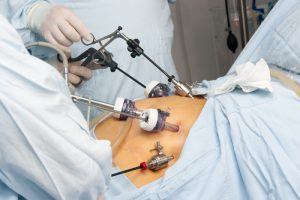 If you are interested in pursuing bariatric weight loss surgery, you have probably heard of gastric bypass surgery (also called roux-en-Y gastric bypass). It is a great treatment option if you are dealing with weight-related health problems and hoping to lose weight and keep it off long-term. It is one of the most commonly performed bariatric surgeries in the United States, and it has a track record of effectiveness.
If you are interested in pursuing bariatric weight loss surgery, you have probably heard of gastric bypass surgery (also called roux-en-Y gastric bypass). It is a great treatment option if you are dealing with weight-related health problems and hoping to lose weight and keep it off long-term. It is one of the most commonly performed bariatric surgeries in the United States, and it has a track record of effectiveness.
If you think this may be the right option for you, we know that you probably have many questions, especially about the gastric bypass procedure itself. We will take you through the process step by step in this post.
What to expect with the gastric bypass procedure
Prior to the procedure, you will be given a general anesthetic. This will allow you to be asleep throughout the duration of the surgery, and you will not feel any pain. At Birmingham Minimally Invasive Surgery, we perform laparoscopic gastric bypass, so once you are asleep, your surgeon will create six small surgical openings on your abdomen. The laparoscope and small surgical instruments are introduced through these openings.
During the procedure, your surgeon will divide your stomach and reroute your small intestine to create a small stomach pouch and new digestive route. The small stomach pouch will restrict your food intake.
A Y-shaped section of the small intestine is attached to the pouch to allow food to bypass the lower stomach, the duodenum (the first segment of the small intestine), and the first portion of the jejunum (the second segment of the small intestine). This bypass route reduces the absorption of nutrients, which also reduces the calorie intake. At the end of the surgery, your surgeon will check the new connections to make sure there are no leaks.
The surgery typically takes one to two hours and requires a stay of at least one night in the hospital.
After the gastric bypass procedure
While that’s it for the procedure itself, we want to share more information about exactly what happens after the procedure. Depending on your condition, you may be given a clear-liquid diet the day of your surgery. You may be able to start a pureed diet before you go home. You will be given medications to help alleviate any pain or discomfort. We will also instruct you on a special diet plan to follow after surgery. You may have restrictions or limits on how much and what you can eat and drink.
We will ask you to come in for regular checkups to monitor your health in the first several months after your gastric bypass procedure. You may need laboratory testing, blood work, and other various exams. We will also be monitoring your weight loss.
By restricting your stomach’s ability to hold food, you will naturally eat less and feel full sooner. This often allows patients to rapidly lose weight and regain control of their lives. With our competitive pricing options and the help of our experienced surgeon and staff, you’ll be able to lose weight and start feeling better physically and mentally. Find more information about gastric bypass costs here.
Contact Us to Learn More About Gastric Bypass Surgery
Birmingham Minimally Invasive Surgery is a caring group of professionals who specialize in all types of bariatric surgery. Our surgeon Dr. Jay Long has highly specialized training in bariatric surgery, having completed a fellowship in minimally invasive and bariatric surgery at The Methodist Hospital in Houston, Texas, where he focused on taking care of patients that are morbidly obese. And we are so proud of our pricing that we publish the costs right on the front page of our website! Insurance won’t pay? We have a variety of financing options we can offer you so that you are able to get the healthy body you’ve wanted for years. Visit us today at http://www.bmisurgery.com/ or give us a call to set up a consultation at 205-833-6907.

